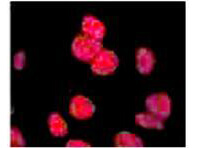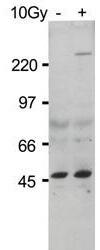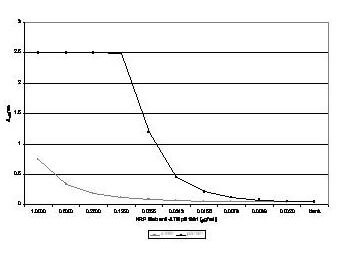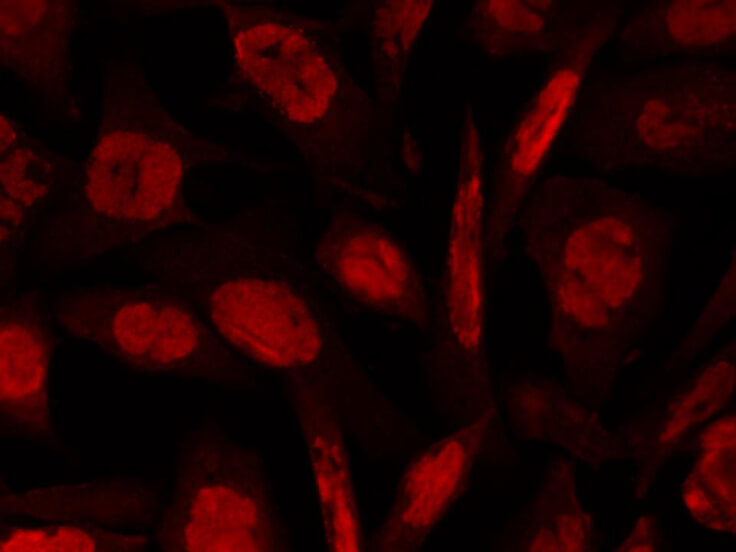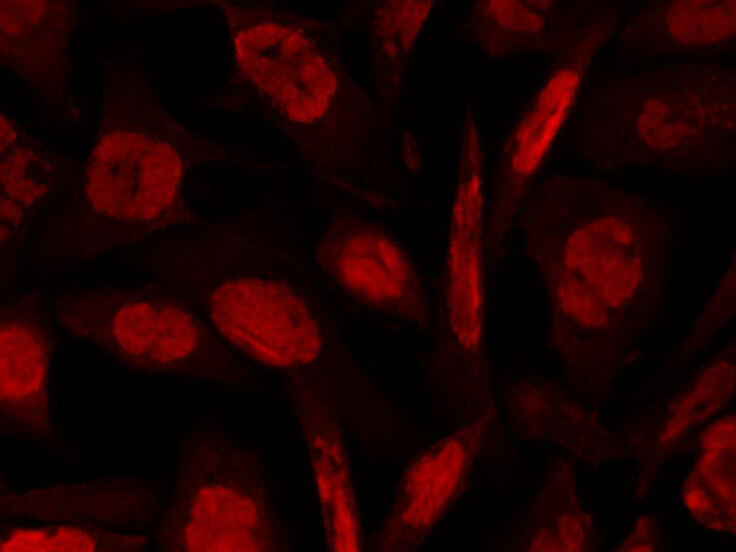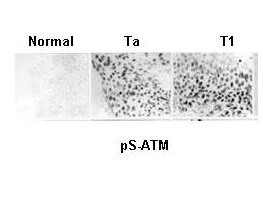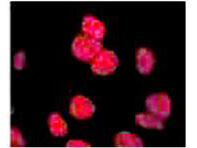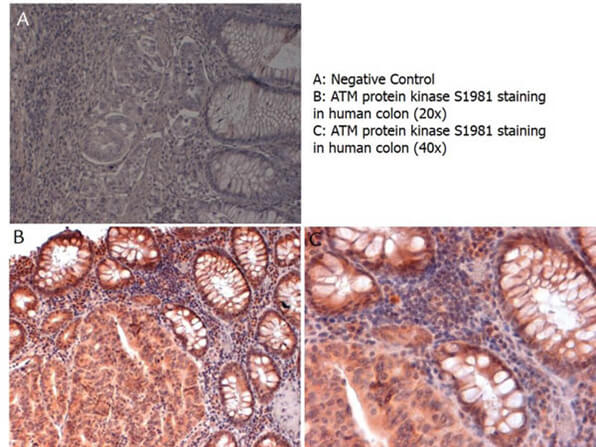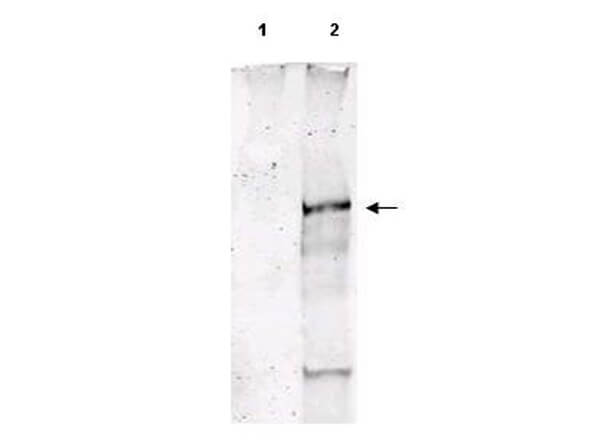Datasheet is currently unavailable. Try again or CONTACT US
ATM phospho S1981 Biotin Conjugated Antibody
Mouse Monoclonal 10H11.E12 IgG1 kappa
200-306-400
100 µg
Lyophilized
WB, ELISA
Human, Mouse, Rat
Mouse
Shipping info:
$50.00 to US & $70.00 to Canada for most products. Final costs are calculated at checkout.
Product Details
Anti-ATM Protein Kinase pS1981 (MOUSE) Monoclonal Antibody Biotin Conjugated - 200-306-400
mouse anti-ATM antibody biotin, mouse anti-ATMpS1981 antibody biotin conjugation, biotin conjugated mouse anti- ATM pS1981 antibody, DKFZp781A0353 antibody, Human phosphatidylinositol 3 kinase homolog antibody, MGC74674 antibody, Serine protein kinase ATM antibody, T cell prolymphocytic leukemia antibody, AT mutated antibody, AT protein antibody, AT1 antibody, ATA antibody, Ataxia telangiectasia gene mutated in human beings antibody, Ataxia telangiectasia mutated antibody, ATC antibody, ATDC antibody, ATE antibody, ATM antibody
Mouse
Biotin
Monoclonal
IgG1
Target Details
ATM - View All ATM Products
Human, Mouse, Rat
Phosphorylation
Conjugated Peptide
This antibody was produced from a synthetic peptide S-L-A-F-E-E-G-Sp-Q-S-T-T-I-S-S corresponding to aa 1974-1988 of human ATM.
This Protein A Purified Mab antibody is directed against human ATM and is useful in determining its presence in various assays. This monoclonal anti-ATM antibody recognizes the phosphorylated epitope in native and over-expressed proteins found in various tissues and extracts. Reactivity is observed against human and mouse ATM. Cross reactivity with ATM from other mammalian sources has not been tested.
Application Details
ELISA, WB
This antibody was tested by ELISA and western blotting against both the native and recombinant forms of the protein. This reagent may also be suitable other biotin-streptavidin based assays.
Formulation
1.0 mg/mL by UV absorbance at 280 nm
0.02 M Potassium Phosphate, 0.15 M Sodium Chloride, pH 7.2
0.01% (w/v) Gentamicin Sulfate. Do NOT add Sodium Azide!
10 mg/mL Bovine Serum Albumin (BSA) - Immunoglobulin and Protease free
100 µL
Restore with deionized water (or equivalent)
Shipping & Handling
Ambient
Store vial at 4° C prior to restoration. For extended storage aliquot contents and freeze at -20° C or below. Avoid cycles of freezing and thawing. Centrifuge product if not completely clear after standing at room temperature. This product is stable for several weeks at 4° C as an undiluted liquid. Dilute only prior to immediate use.
Expiration date is one (1) year from date of receipt.
ATM, the gene mutated in the hereditary disease ataxia-telangiectasia, codes for a protein kinase that acts as a master regulator of cellular responses to DNA double-strand breaks. ATM is normally inactive and the question of how it is activated in the event of DNA damage (due to ionizing radiation for instance) is central to understanding its function. ATM protein is now shown to be present in undamaged cells as an inactive dimer. Low doses of ionizing radiation, which induce only a few DNA breaks, activate at least half of the total ATM protein present, possibly in response to changes in chromatin structure. The ATM gene encodes a 370-kDa protein that belongs to the phosphoinositide 3-kinase (PI(3)K) superfamily, but which phosphorylates proteins rather than lipids. The 350-amino-acid kinase domain at the carboxy terminus of this large protein is the only segment of ATM with an assigned function. Exposure of cells to IR triggers ATM kinase activity, and this function is required for arrests in G1, S and G2 phases of the cell cycle. Several substrates of the ATM kinase participate in these IR-induced cell-cycle arrests. These include p53, Mdm2 and Chk2 in the G1 checkpoint; Nbs1, Brca1, FancD2 and SMC1 in the transient IR-induced S-phase arrest; and Brca1 and hRad17 in the G2/M checkpoint. Ideal for Cancer, Cell Signaling, Chromatin, Neuroscience and Signal Transduction research.
This product is for research use only and is not intended for therapeutic or diagnostic applications. Please contact a technical service representative for more information. All products of animal origin manufactured by Rockland Immunochemicals are derived from starting materials of North American origin. Collection was performed in United States Department of Agriculture (USDA) inspected facilities and all materials have been inspected and certified to be free of disease and suitable for exportation. All properties listed are typical characteristics and are not specifications. All suggestions and data are offered in good faith but without guarantee as conditions and methods of use of our products are beyond our control. All claims must be made within 30 days following the date of delivery. The prospective user must determine the suitability of our materials before adopting them on a commercial scale. Suggested uses of our products are not recommendations to use our products in violation of any patent or as a license under any patent of Rockland Immunochemicals, Inc. If you require a commercial license to use this material and do not have one, then return this material, unopened to: Rockland Inc., P.O. BOX 5199, Limerick, Pennsylvania, USA.

